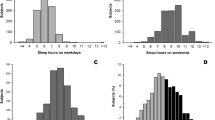Conclusions
-
1.
Learning sessions for the acquisition and extinction of alimentary conditioned responses do not significantly alter the structure of the wakefulness-sleep cycle during the post-conditioning period, and the percentage ratio of the different phases is preserved, without an augmentation of one of them.
-
2.
Under the influence of learning sessions the number of awakenings for the deprivation of paradoxical sleep does not change, making it possible to reject the idea that learning has any appreciable influence on the formation of PS requirement.
-
3.
PS deprivation brought about by non-emotional awakening after learning sessions does not delay the acquisition or extinction of alimentary conditioned responses.
-
4.
The conclusion is drawn that paradoxical sleep has no specific role to play in memory trace consolidation during the formation of long-term memory.
Similar content being viewed by others
Literature cited
L. P. Latash and G. A. Manov, “Delta sleep and the physical component of ‘fast sleep’ in relation to the retention and reproduction of material learned before sleep,” Fiziol. Cheloveka,1, No. 2, 262 (1975).
G. A. Manov, Some Aspects of the Functional Interaction between Sleep and Memory [in Russian], Thesis submitted for the degree of Candidate of Biological Science, Inst. Morf. Ekol. Zhivot. Akad. Nauk SSSR, Moscow (1973).
T. N. Oniani, “Effect of deprivation of paradoxical sleep on learning the active avoidance reaction,” Fiziol. Zh. SSSR,30, NO. 5, 587 (1984).
T. N. Oniani, L. B. Gvetadze, and Sh. D. Mandzhavidze, “Dynamics of the neuronal activity of the midbrain reticular structures in the wakefulness-sleep cycle,” Neurofiziologiya,16, No. 5, 678 (1984).
J. Albert, G. Cicala, and J. Siegle, “The behavioral effects of the REM sleep deprivation in rats,” Psychophysiology,6, No. 5, 550 (1970).
E. Aserinsky and N. Kleitman, “The two types of ocular motility occurring in sleep,” J. Appl. Physiol.,8, No. 1, 11 (1953).
V. Bloch, E. Hennevin, and P. Leconte, “The phenomenon of paradoxical sleep augmentation after learning: experimental studies of its characteristics and significance,” in: Sleep, Dreams, and Memory, W. Fishbein (ed.), Acad. Press, New York (1981), p. 1.
W. Dement, “The occurrence of low voltage fast electroencephalographic patterns during behavioral sleep in the cat,” EEG Clin. Neurophysiol,10, No. 2, 291 (1958).
W. Dement and N. Kleitman, “The relation of eye movements during sleep to dream activity. An objective method for the study of dreaming,” EEG Clin. Neurophysiol.,53, No. 3, 339 (1957).
B. Ekstrand, T. Barret, J. West, and W. Maier, “The effect of sleep on human long-term memory,” in: Neurobiology of Sleep and Memory, R. Drucker-Colin and G. McGaugh (eds.), Acad. Press, New York-San Francisco-London (1975), p. 419.
W. Fishbein and B. Gutvein, “Paradoxical sleep and memory storage processes,” Behav. Biol.,19, No. 5144, 425 (1977).
Y. Jenkins and K. Dallenbach, “Oblivation during sleep and waking,” Am. J. Psychol.,35, 605 (1924).
M. Jouvet, “The rhombencephalic phase of sleep,” Progr. Brain Res.,1, No. 1, 406 (1963).
M. Jouvet, “Biogenic amines and the states of sleep,” Science,163, No. 3968, 117 (1967).
M. Koridze, N. Nemsadze, and L. Maisuradze, “Effect of paradoxical sleep deprivation on active avoidance in rats,” Abstr. VI Int. Neurobiol. Sympos. on Learning and Memory, Magdeburg (1980), p. 30.
M. Lucero, “Lengthening of REM sleep duration consecutive to learning in the rat,” Brain Res.,20, No. 2, 319 (1970).
T. Oniani, “Does paradoxical sleep deprivation disturb memory trace consolidation,” Physiol. Behav.,33, No. 5, 687 (1984).
G. Partnoff, F. Backeland, D. Goodenough, L. Karacan, and A. Shapiro, “Retention of verbal materials perceived immediately prior to onset of non-REM sleep,” J. Percept. Motor Skills,2, No. 22, 751 (1966).
M. Sakuma, “Influence of avoidance conditioning on sleep,” Skikoku Acta Med.,32, No. 2, 339 (1976).
J. Siegel, “Unit activity in reticular formation in REM sleep,” in: The Functions of Sleep, R. Drucker-Colin, M. Shkurovich, and M. Sterman, (eds.), Acad. Press, New York (1979), p. 31.
R. Ursin, “The two stages of slow-wave sleep in the cat and their relation to REM sleep,” Brain Res.,11, No. 2, 347 (1968).
Z. Van Hulzen and M. Coenen, “Selective deprivation of paradoxical sleep and consolidation of shuttle-box avoidance,” Physiol. Behav.,23, No. 5 821 (1979).
E. Van Omer, “Sleep and retention,” Psychol. Bull.,30, No. 6, 413 (1933).
Author information
Authors and Affiliations
Additional information
Translated from Zhurnal Vysshei Nervnoi Deyatel'nosti imeni I. P. Pavlova, Vol. 36, No. 3, pp. 460–467, May–June, 1986.
Rights and permissions
About this article
Cite this article
Oniani, T.N., Lortkipanidze, N.D. & Maisuradze, L.M. Interaction between learning and paradoxical sleep in cats. Neurosci Behav Physiol 17, 304–310 (1987). https://doi.org/10.1007/BF01183059
Received:
Issue Date:
DOI: https://doi.org/10.1007/BF01183059




